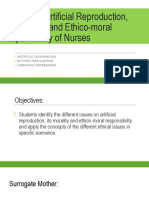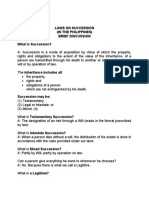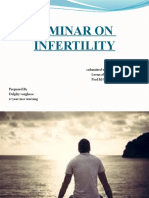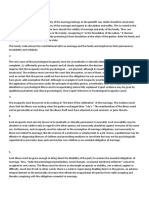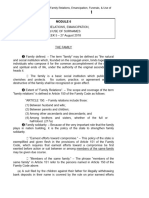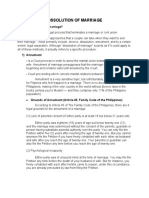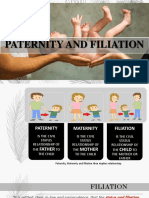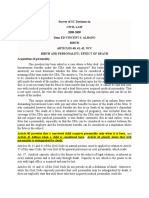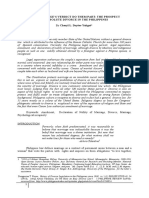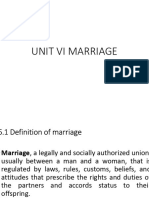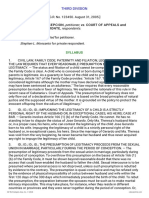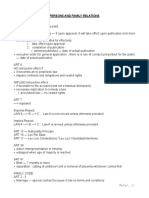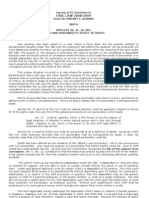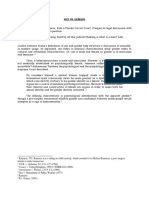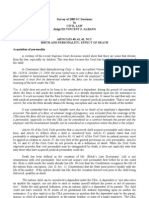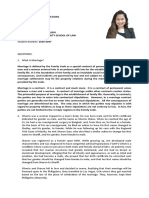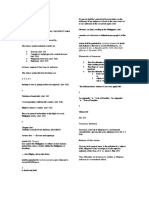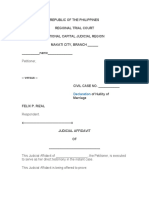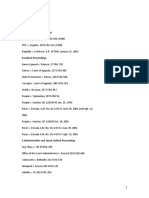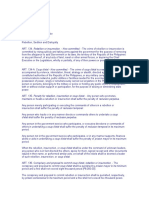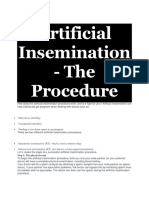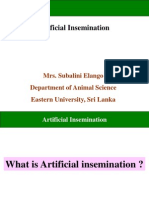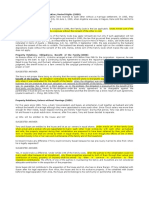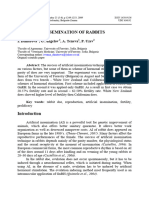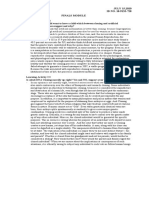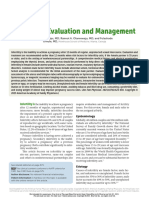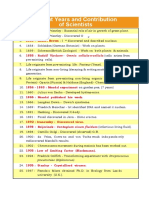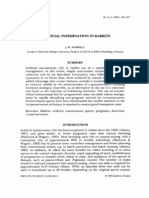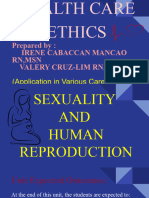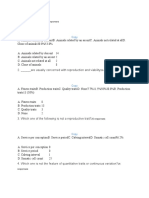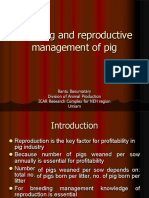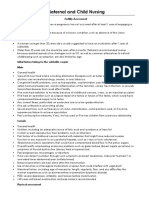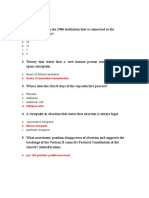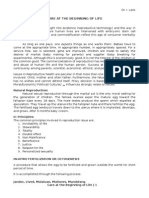Declaration of Nullity and Annulment of Marriage, and Legal Separation in The Philippines
Declaration of Nullity and Annulment of Marriage, and Legal Separation in The Philippines
Uploaded by
fadzram joefoxCopyright:
Available Formats
Declaration of Nullity and Annulment of Marriage, and Legal Separation in The Philippines
Declaration of Nullity and Annulment of Marriage, and Legal Separation in The Philippines
Uploaded by
fadzram joefoxOriginal Title
Copyright
Available Formats
Share this document
Did you find this document useful?
Is this content inappropriate?
Copyright:
Available Formats
Declaration of Nullity and Annulment of Marriage, and Legal Separation in The Philippines
Declaration of Nullity and Annulment of Marriage, and Legal Separation in The Philippines
Uploaded by
fadzram joefoxCopyright:
Available Formats
ome ›
DECLARATION OF NULLITY AND
ANNULMENT OF MARRIAGE, AND LEGAL
SEPARATION IN THE PHILIPPINES
Is there Divorce in the Philippines?
As a general rule, Divorce is not allowed in the Philippines. The only exception is when there is a
Judicial Recognition of a Foreign Divorce–when a marriage between a Filipino citizen and
a foreigner is validly celebrated and a divorce is thereafter validly obtained abroad by the alien
spouse capacitating him or her to marry, the Filipino spouse shall likewise have the capacity to
remarry under the Philippine law
Is declaring the nullity of a marriage different from annulment?
Yes. A declaration of nullity of marriage applies to marriages which are void. Void Marriages are
considered as having never been taken place, they are void from the very beginning. On the other
hand, Annulment applies to a marriage that is valid until otherwise declared by the court annulled.
What are the grounds to declare the nullity of a marriage?
Absence of the Essential Requisites of Marriage – Consent and Legal Capacity of the Parties
Bigamous Marriages
Incestuous Marriages
Psychological Incapacity
What is Psychological Incapacity?
Psychological Incapacity contemplates the incapacity to perform the basic marital obligations. The
said incapacity must be grave enough to be the cause of the party’s inability to assume the
essential obligations of marriage. This inability should not be a mere refusal, neglect, or difficulty to
perform such obligations. The root cause of the incapacity must be medically proven and must be
shown to be medically or clinically incurable, such root cause must be identified as psychological
illness. Each case of Psychological Incapacity is to be treated differently.
What are the Essential Marital Obligations?
Article 68 of the Family Code provides that the husband and wife are obliged to live together,
observe mutual love, respect and fidelity, and render mutual help and support.
What are the grounds for a marriage to be annulled?
Article 45 of the Family Code provides that a marriage may be annulled for any of the following
causes, existing at the time of the marriage:
Lack of Parental Consent
Insanity
Consent was obtained thru Fraud
Consent was obtained thru Force, Intimidation, and Undue Influence
Impotence
Sexually Transmitted Diseases
What is Legal Separation?
A decree of legal separation is nothing more than bed-and-board separation of the spouses. The
marital ties are not severed; hence the parties cannot remarry.
What are the grounds for Legal Separation?
Article 55 of the Family Code provides that a petition for legal separation may be filed on any of the
following grounds:
Repeated physical violence or grossly abusive conduct
Physical violence to compel the petitioner to change religious or political affiliation
Attempt of respondent to corrupt or induce to engage in prostitution
Imprisonment of more than six years
Drug addiction or habitual alcoholism of the respondent;
Lesbianism or homosexuality of the respondent
Contracting by the respondent of a subsequent bigamous marriage
Sexual infidelity or perversion
Attempt by the respondent against the life of the petitioner
Abandonment of petitioner by respondent without justifiable cause for more than one year.
Statistics Office (NSO) who made this convention possible, good morning. The topic assigned to
me is “Children‟s Rights Specifically on Legitimation and Acknowledgment.” It has a soft spot in
my heart for two reasons. One, I am a professor of Persons and Family Relations, one of the
subjects I handle at the University of the East-College of Law. I discuss at length with my class
the Family Code, which includes important provisions on the rights of children. And two, I am a
mother of two lovely girls, my inspiration, my source of pride and joy. I consider both my class
and my daughters as my babies. I do my best in helping them equip themselves with their needs,
which they may apply in law or in life or both. So, I thank the organizers for like my babies, this
topic is close to my heart. Named and called …. children Painful was the scene that I had seen. A
man, gigantic in stature, his body distorted in its proportion, was standing on a large fragment of
ice floating on the ocean. He had long locks of ragged hair and his face, in color and texture, like
that of a mummy was full of bitterness. He was going to drown himself in the freezing waters. But
before he submerged himself to death, mournfully he cried, “He did not even give me a name.”
What I have narrated was a scene in the movie Frankenstein. Victor Frankenstein’s creation was
shouted at with these words: “vile insect, abhorred 2 monster, fiend, wretched.”1 Hideous may his
countenance be, but like any creature, he craved to be called by his first name, by his surname. But
both – he did not have… Just how important is a name? “Naming things was the first task and
privilege given to human beings in the Garden of Eden. „So from the soil Yahweh God fashioned
all the wild animals and all the birds of heaven. These he brought to the man to see what he would
call them; each one was to bear the name the man would give it. (Genesis 2:19) ‟ ” 2 We are not
God nor are we playing God, like Frankenstein. We are ordinary yet responsible mortals who give
birth or sire children worthy of our names (specifically our family names). A person’s name
consists of one or more Christian name and one family name. Family name or surname is that
which identifies the family to which the individual belongs and is continued from parent to child.
3 Use of surnames of the father and the mother is one of the rights enjoyed by the fortunate ones
among the children in our country. I said fortunate ones because not all of them enjoy the right to
bear the surnames of both of their parents. There are two kinds of children: legitimate and
illegitimate. The Family Code defines said children, thus: Legitimate – Those conceived or born
during a valid marriage of the parents, or within lawful wedlock. (Article 164) Illegitimate –
Those conceived and born outside a valid marriage or outside lawful wedlock. (Article 165)
Herein under are the kinds of children : 4 1. Legitimate - a) Those conceived or born within lawful
wedlock – Children conceived and born during the marriage of the parents are necessarily
legitimate. But a child, although conceived before marriage, but born already during the marriage,
is likewise legitimate; and so with a 1 Mary Shelley, Frankenstein, (First published in 1818;
Bantam reissue edition, USA: Bantam Books, 1991), p.83. 2 Laurie Beth Jones, The Power of
Positive Prophecy, (New York: Hyperion, 1999) p. 14. 3 Federico B. Moreno, Moreno’s Law
Dictionary (Quezon City: Rex Printing Co., Inc., 2000) p. 304. 4 Alicia V. Sempio-Diy, Handbook
on the Family Code, (Quezon City: Joer Printing Services, 1999) pp. 85, 255, 257-259, 262. 3
child who, although born outside the marriage, was conceived during the marriage. Examples: 1)
Suppose a child was conceived out of pre-marital relations between a man and a woman, but the
two got married before the child was born, so that when the woman gave birth to the child, she is
already married to the child’s father. The child is legitimate, having been born during the marriage
of the parents. 2) On the other hand, let us take the case of a wife who was pregnant when her
husband suddenly died in an accident. Thus, when the child was born, the father was already dead.
The child is legitimate, since it was conceived during the marriage of the parents. b) Those
conceived and born as a result of artificial insemination – Paragraph 2 of Article 164 gives the
status of a legitimate child to a child conceived by artificial insemination under the following
conditions: 1) The artificial insemination is made on the wife, not on another woman; 2) The
artificial insemination of the wife is done with the sperm of the husband or of a donor or both the
husband and a donor; 3) The artificial insemination has been authorized or ratified by the spouses
in a written instrument executed and signed by them before the birth of the child; and 4) The
written instrument aforementioned is recorded in the civil registry together with the birth
certificate of the child. c) Children conceived while the parents were still living under a voidable
marriage but born after the marriage of the parents had been annulled are still legitimate, having
been conceived during the marriage of the parents; d) Children conceived of parents who, being
lawfully married, later separated, whether de facto or legal, so that when the children were born,
the parents are already separated, are legitimate, because they were conceived and born during the
marriage of the parents; e) Those conceived or born of void marriages under Article 36 because of
the psychological incapacity of one of the spouses ; 4 f) Those conceived or born of the
subsequent marriage under Article 54, shall be legitimate, although said subsequent marriage is
null and void; g) Those conceived or born before the judgment of annulment of marriage (This is
because voidable or annullable marriages are valid until annulled); h) Adopted; i) Legitimated. 2)
Illegitimate – a) Those born of couples who are not legally married, or of common-law marriages;
b) Those born of bigamous marriages; c) Those born of adulterous relations between the parents;
d) Those born of couples below 18, whether they are married (which marriage is void) or not; e)
Those born within marriages that are void from the beginning under Article 35 of the Family
Code, except where the marriage of the parents is void for lack of authority on the part of the
solemnizing officer, but the parties or either of them had believed in good faith that the
solemnizing officer had authority, in which case the marriage will be considered valid and the
children will be considered legitimate. (Article 35, par. (2)); f) Those born of marriages that are
incestuous and void from the beginning under Article 37; g) Those born of void marriages for
reasons of public policy under Article 38. While the legitimate children have the right to bear the
surnames of their father and mother, 5 the illegitimate can only use the surname of their mother. 6
5 Family Code of the Philippines, Article 174. 6 Ibid., Article 176. 5 Support and Legitime The
legitimate children also have the right: To receive support from their parents, their ascendants,
and in proper cases their brothers and sisters, in conformity with the provisions of the Civil Code
on Support; 7 and To be entitled to the legitime and other successional rights granted to them by
the Civil Code. 8 The benefits that I have mentioned for the legitimate children are provided by
the Family Code. A Code that is not selfish, according to Dean Ernesto L. Pineda. In his speech
delivered last January 7 at the Faculty of Canon Law in the University of Santo Tomas, he said
that the Family Code “does not only care for legitimate families but even those which are not.
While the Code does not give premium or encouragement to illegitimate relationships, it, however,
recognizes certain legal consequences arising out of such illegitimate relationships.” 9 To prove
the concern of the Code to those born out of wedlock, Dean Pineda mentioned the following
benefits as among the benefits and advantages provided by the Family Code for the illegitimate
children : It gives recognized illegitimate children the right to be supported by their
acknowledging parents, as well as brothers and sisters; It gives successional rights to the
illegitimate children so long as they have been duly recognized by their putative parents (Art. 176,
Family Code in relation to Article 887, New Civil Code). The support that we are talking about
here comprises everything indispensable for sustenance, dwelling, clothing, medical attendance,
education, and transportation, in keeping with the financial capacity of the family. 10 The
education of the person entitled to be supported referred to in the preceding paragraph shall
include his schooling or training for some profession, trade or vocation, even beyond the age of
majority. Transportation shall include expenses in going to and from school, or to and from place
of work. 11 Sen. Hillary Rodham-Clinton said that it takes a village to raise a child. Literally
bigger than a village, the State, as parens patriae is the parent of all children for all times. It takes
care of their present needs through the provisions 7 Ibid., Article 174, paragraph 2. 8 Ibid.,
paragraph 3. 9 Dean Ernesto L. Pineda, “The Family as Envisioned in the Family Code,” Lawyer’s
Review, February 28, 2003, p. 78. 10 Supra, Note 5, Article 194. 11 Ibid., paragraph 2. 6 of law
on support. The future though distant, is not dark and dismal for the children because the State
provides them a legitime. Legitime is that part of the testator’s property which he cannot dispose
of because the law has reserved it for certain heirs who are, therefore, called compulsory heirs.12
The purpose of the legitime is to protect the children and the surviving widow or widower from
the unjustified anger or thoughtlessness of the other spouse. 13 Legitimation , Acknowledgment:
Bridges to Legitimacy Legitimation and acknowledgment give rise to the rights of children that I
have mentioned. Legitimation is a remedy by means of which those who in fact were not born in
wedlock and should, therefore, be considered legitimate, it being supposed that they were born
when their parents were already married.14 Legitimation takes place by the subsequent valid
marriage of the parents of the child.15 Legitimated children are originally illegitimate but later
considered legitimate by legal fiction because of the subsequent marriage of the parents who, at
the time of the child’s conception, had no legal impediment to marry each other. Legitimated
children enjoy the rights of legitimate children,16 as to the use of surname of both parents, support
and legitime which I have mentioned earlier. A married couple who would want to file for
legitimation has to execute a joint affidavit of legitimation. Attached to it are the couple’s
marriage certificate and birth certificate of the child, who is to be legitimated. The affidavit
together with the attached documents shall be submitted to the local civil registry where the birth
of the child is registered. The upper right corner of the certificate of live birth is reserved for
remarks/annotation. The local civil registrar shall place there legitimated, the new status of the
child. The documents pertaining to the legitimated child shall then be submitted to the National
Statistics Office (NSO). The effects of legitimation shall retroact to the time of the child’s birth.17
Legitimation may be impugned by “those who are prejudiced in their rights, which means those
who would suffer economic or material injury by the legitimation like testamentary or intestate
heirs. Creditors are excluded, because they step into the picture only when there is repudiation of
inheritance by the heirs. 12 Civil Code of the Philippines Volume III, Article 886. 13 Edgardo L.
Paras, Civil Code of the Philippines Annotated Volume III, (Manila: Rex Bookstore, 1999) p. 271.
14 Supra, Note 4, p. 284. 15 Supra, Note 5, Article 178. 16 Ibid., Article 179. 17 Ibid., Article
180. 7 Legitimation may be impugned within five (5) years from the time the cause of action
accrues, which is from the death of the putative parent because before that, the heirs of the child
have no personality to bring the action.”18 Now let’s talk about acknowledgment.
Acknowledgment, also known as recognition is defined as the process of declaring legally that a
certain person is one’s own child.19 Children are given their status from the moment of their birth.
Thus, there is no need for them to file an action against their parents for recognition. Such status
may, however, be questioned. Hence, the need for Article 172 which states the evidences that
legitimate children may present to establish or prove their status or filiation and in the absence
thereof alternative means are provided therein. Article 172 provides: “Article 172. The filiation of
legitimate children is established by any of the following: (1) The record of birth appearing in the
civil register or a final judgment; or (2) An admission of legitimate filiation in a public document
or a private handwritten instrument and signed by the parent concerned. In the absence of the
foregoing evidence, the legitimate filiation shall be proved by: (1) The open and continuous
possession of the status of a legitimate child; or (2) Any other means allowed by the Rules of
Court and special laws.” “As far as asserting their status is concerned, illegitimate children are
placed on the same footing as legitimate children.”20 Article 175 clearly states that illegitimate
children may establish their illegitimate filiation in the same way and on the same evidence as
legitimate children. Article 173 states that the action to claim legitimacy may be brought by the
legitimate children during their lifetime. What about the illegitimate children, are they also entitled
to file said action within the same period? 18 Supra, Note 4, p. 288. 19 Supra, Note 3, p. 9. 20
Ruben F. Balane, “Family Courts and Significant Jurisprudence in Family Law,” Journal of the
Integrated Bar of the Philippines, Vol. XXVII, No. 1, 2001, p. 49. 8 Justice Alicia V. Sempio-Diy
enlightens us by providing the following answers: “If the action is based on the record of the birth
of the child , a final judgment, or an admission by the parent of the child‟s filiation in a public
document or in private handwritten, signed document, Yes, because there is no longer any
question that the child is really the illegitimate child of his putative parent. He can, therefore,
claim his rights as such even after the death of his parent, including his share in the latter‟s estate
as heir. “But if the action is based on the open and continuous possession by the child of the status
of an illegitimate child, or on other evidences allowed by the Rules of Court and special laws, No.
In these cases, the action must be brought during the lifetime of the alleged parent.” 21 (Emphases
supplied). What about the illegitimate children who were still minors at the time the Family Code
took effect and whose putative parent died during their minority? Have they already lost the right
to file an action for recognition? Apparently, no. Article 285 of the Civil Code comes to their
rescue. It provides the period for filing an action for recognition as follows: “Article 285. The
action for the recognition of natural children may be brought only during the lifetime of the
presumed parents, except in the following cases: (1) If the father or mother died during the
minority of the child, in which case the latter may file the action before the expiration of four
years from the attainment of his majority; (2) If after the death of the father or of the mother a
document should appear of which nothing had been heard and in which either or both parents
recognized the child. In this case, the action must be commenced within four years from the
finding of the document.” In Ernestina Bernabe vs Carolina Alejo as guardian ad litem for the
minor Adrian Bernabe (G.R. No. 140500, January 21, 2002), the Supreme Court ruled in favor of
the minor. In a Justice Panganiban-penned decision it stated that “Xxx illegitimate children who
were still minors at the time Family Code took effect and whose putative parent died during their
minority are thus given the right to seek recognition (under Article 285 of the Civil Code) for a
period of up to four years from attaining majority age. This vested right was not impaired or taken
away by the passage of the Family Code.” 21 Supra, Note 4, p.282. 9 Justice Artemio Panganiban
echoed the overriding consideration of the magistrates, which he said was “to protect the vested
rights of minors who could not have filed suit, on their own, during the lifetime of their putative
parents. Xxx the State as parens patriae should protect a minor‟s right. Born in 1981, Adrian was
only seven years old when the Family Code took effect and only twelve when his alleged father
died in 1983. The minor must be given his day in court.” Illegitimate children like Adrian, once
recognized, are entitled to their share of the estate of their parent who earlier failed to
acknowledge them. However, as I have said earlier they are barred from using the surname of their
father. In the case of Marissa A. Mossesgeld versus Court of Appeals and Civil Registrar General
(G. R. No. 111455) the putative father was denied registration of the certification of live birth of
his illegitimate child using his surname, for it is contrary to law, specifically, Article 176. On
December 23, 1998, the Supreme Court made a ruling, the pertinent portion of which reads:
“Article 176 of the Family Code of the Philippines provides that „illegitimate children shall use
the surname and shall be under the parental authority of their mother, and shall be entitled to
support in conformity with this Code.‟ This is the rule regardless of whether or not the father
admits paternity. Consequently, the Local Civil Registrar correctly refused to register the
certificate of live birth of petitioner‟s illegitimate child using the surname of the alleged father,
even with the latter‟s consent. Of course, the putative father, though a much married man, may
legally adopt his own illegitimate child. In case of adoption, the child shall be considered a
legitimate child of the adopter, entitled to use his surname.” In the Republic versus Abadilla (G. R.
No. 133054, January 28, 1999) the magistrates also cited Article 176 as the applicable provision in
the case of illegitimate children, Emerson and Rafael. Through Justice Quisumbing, the ponente of
the case, they said: “During the birth of Emerson and Rafael, the Family Code was already the
governing law and Article 176 of which provides as follows: „Art. 176. Illegitimate children shall
use xxx the surname xxx of their mother xxx.‟ Thus, as illegitimate children, Emerson and Rafael
should bear the surname of their mother, Luzviminda Celestino. Resultingly, with the correction
of the entries in their birth certificates which deleted the entry in the date and place of marriage of
parents, corresponding correction with respect to their surname should have also been made and
changed to Celestino, their mother‟s surname.” How many more children would be denied of their
father’s surname? This is a question which calls for an answer from the men and women who are
in a relationship that produces illegitimate offsprings. 10 In his book, The Prophet , 22 Kahlil
Gibran said: “You are the bows from which your children as living arrows are sent forth. The
Archer sees the mark upon the path of the infinite, and He bends you with His might that His
arrows may go swift and far. Let your bending in the Archer‟s hand be for gladness; For even as
He loves the arrow that flies, so He loves also the bow that is stable.” We parents are the bows of
the Good Lord, the Archer. We are needed to set forth our children, the arrows to a bright future.
But before we can even think of the future we need to look into their present needs. And their
needs could very well start with having a name… a full name they can truly be proud of.
Ecclesiastes 7: 1 reminds us, “Better a good name than a costly oil.” There are lawmakers in our
country who agree with this biblical reminder. They are Representatives Cynthia Villar, Joaquin
Chipeco Jr., Roque Ablan Jr., Orlando Fua Jr., Eladio “Boy” Jala and Roberto Cajit and Senators
Sergio Osmeña III, Robert Barbers, Manuel Villar Jr., Ramon Revilla, Blas Ople, Loren Legarda,
Edgardo Angara and Luisa Ejercito Estrada. The representatives are the authors of House Bill No.
4437, entitled An Act Providing that Illegitimate Children may Use the Surname of their Father,
Amending for the Purpose of Article 176 of the Family Code of the Philippines and the senators
are the proponents of Senate Bill No. 2510, entitled An Act Allowing Illegitimate Children to Use
the Surname of their Father, Amending for the Purpose of Article 176 of Executive Order 209,
Otherwise Known as the “Family Code of the Philippines.” While House Bill No. 4437 has
already been approved, its counterpart in the Senate is still pending for approval. Yours truly
humbly opines that Senate Bill No. 2510 needs all the help it can get for it to be made into a law. I
believe that illegitimate children should not be denied of their father’s surname. Illegitimate
children have the misfortune of being born into a relationship frowned upon in our society, a
relationship that is neither moral nor legal. They are identified with the misdeed of their father and
mother, yet they are not given the right to be similarly identified with one of their parents for they
are refused with their father’s surname. Their innate right to be respected as human beings is
prejudiced, especially so when they are subjected to name calling. They are called bastards, putok
sa buho. “It is hardly unfair,” says Justice Panganiban, “to stigmatize children who had no fault in
nor control over the marital impediments which bedeviled their parents. Why then should 22
Kahlil Gibran, The Prophet, (Great Britain: William Heinemann, 1926; Senate 1997 edition,
United Kingdom: Senate Press Limited) pp. 20, 21. 11 they suffer the consequences? In the final
analysis, there are no illegitimate children; there are only illegitimate parents.” 23 The filing of
Senate Bill No. 2510 is timely; just what the aforesaid children need. Thus, I trust that it would
become a law. It would not be ignored for as one philosopher had said, “Nothing is more powerful
than an idea whose time has come.” Now, well, it is also time for me to end my sharing about
legitimation and acknowledgment. I thank the organizers for giving me the opportunity to be with
the solemnizing officers in our country, the ones who seal unions that bring forth the future of our
nation. To the solemnizing officers themselves, it’s an honor to be with all of you in this
morning’s session of this informative and well-planned convention.
You might also like
- Bioethics MidtermDocument104 pagesBioethics MidtermJmarie Brillantes Popioco90% (10)
- Week 8 - Powerpoint Issues On Artificial Reproduction, Its Morality andDocument13 pagesWeek 8 - Powerpoint Issues On Artificial Reproduction, Its Morality andArlynn Faith Cabrera80% (5)
- Laws On Succession in The PhilippinesDocument8 pagesLaws On Succession in The Philippinesanna sheilla100% (7)
- Infertility Power Point ObgDocument48 pagesInfertility Power Point ObgDelphy Varghese88% (17)
- Lecture Notes On Family RelationsDocument11 pagesLecture Notes On Family RelationsIda Marie Vega EscolanoNo ratings yet
- Assited Reproductive TechnologyDocument40 pagesAssited Reproductive TechnologySanthosh.S.U100% (1)
- The Family As An InstitutionDocument31 pagesThe Family As An InstitutionmariaceciliassantiagNo ratings yet
- Week 8-Marriage and The FamilyDocument30 pagesWeek 8-Marriage and The FamilyCalamansi SlüshNo ratings yet
- Giving Legal Advice On Cases of Annulment"Document6 pagesGiving Legal Advice On Cases of Annulment"MitchayNo ratings yet
- Family and MarriageDocument47 pagesFamily and MarriageCharina Zulueta MercadoNo ratings yet
- Molina DoctrineDocument30 pagesMolina DoctrineApril Charm ObialNo ratings yet
- SLU Law-Divorce by Elmer ClausDocument18 pagesSLU Law-Divorce by Elmer ClausMarco ClausNo ratings yet
- ITL - WEEK 5Document12 pagesITL - WEEK 5Coco PimentelNo ratings yet
- Dissolution of MarriageDocument7 pagesDissolution of Marriagemindy sansanNo ratings yet
- SSRN Id2647585Document37 pagesSSRN Id2647585Crislyntabigo PerezNo ratings yet
- Legal Medicine, Chapter 27 Vanne Olive AgnisDocument5 pagesLegal Medicine, Chapter 27 Vanne Olive AgnisVanne AgnisNo ratings yet
- Cagandahan vs. Silvirio CaseDocument5 pagesCagandahan vs. Silvirio Casehaberallan211No ratings yet
- Week 9 10 PDFDocument89 pagesWeek 9 10 PDFannie lalangNo ratings yet
- Itl - Week 5Document18 pagesItl - Week 54dzmn8t9ypNo ratings yet
- PATERNITYandFILIATION PDFDocument95 pagesPATERNITYandFILIATION PDFLEIGHNo ratings yet
- Lesson 12: Kinship: Understanding Culture, Society and PoliticsDocument18 pagesLesson 12: Kinship: Understanding Culture, Society and PoliticsPatricia LlanaNo ratings yet
- Concepcion v. Court of Appeals 468 SCRA 438Document20 pagesConcepcion v. Court of Appeals 468 SCRA 438Rose Mary G. EnanoNo ratings yet
- Civil Law - Part 1 Dean Ed Vincent AlbanoDocument48 pagesCivil Law - Part 1 Dean Ed Vincent AlbanoStibun JureonNo ratings yet
- FAMILY CODE Q and ADocument5 pagesFAMILY CODE Q and AAshreffah Diacat-MimbalawagNo ratings yet
- CHAPTER 11 MarriageDocument3 pagesCHAPTER 11 MarriageKai de LeonNo ratings yet
- Republic vs. CagandahanDocument7 pagesRepublic vs. CagandahanhalleybackNo ratings yet
- What Is The Difference Between Adoption and Simulation of BirthDocument6 pagesWhat Is The Difference Between Adoption and Simulation of Birthrlg2vmmc100% (1)
- Till The Judge'S Verdict Do Them Part: The Prospect of Absolute Divorce in The PhilippinesDocument29 pagesTill The Judge'S Verdict Do Them Part: The Prospect of Absolute Divorce in The PhilippinesCheryl L. Daytec-YangotNo ratings yet
- Unit VI MarriageDocument33 pagesUnit VI MarriageHansraj shahNo ratings yet
- Concecpion v. CA PDFDocument13 pagesConcecpion v. CA PDFAlsan IgnaligNo ratings yet
- Marriage and FamilyDocument4 pagesMarriage and FamilyJenny Pasilan QuintanaNo ratings yet
- Atty. Cheryl Daytec-Yangot - Divorce JournalDocument29 pagesAtty. Cheryl Daytec-Yangot - Divorce JournalAga FatrickNo ratings yet
- Surrogacy DebateDocument4 pagesSurrogacy DebateTerence ValdehuezaNo ratings yet
- Final Absolute-Divorce-In-The-PhilippinesDocument13 pagesFinal Absolute-Divorce-In-The-PhilippinesShaira HadjinasserNo ratings yet
- Petitioner Vs Vs Respondents Juan Orendain P. Buted Stephen L. MonsantoDocument12 pagesPetitioner Vs Vs Respondents Juan Orendain P. Buted Stephen L. MonsantoLucio GeorgioNo ratings yet
- Civil Law CrammerDocument49 pagesCivil Law CrammerMariaNo ratings yet
- Chapter 5. Crim 3. JD JjsDocument10 pagesChapter 5. Crim 3. JD JjsgapoymackyNo ratings yet
- Notes MidtermDocument19 pagesNotes MidtermJezzene Gail R. PalerNo ratings yet
- $ Upreme Qcou RT: 3republic Tbe FlbilippinesDocument11 pages$ Upreme Qcou RT: 3republic Tbe FlbilippinesJohn VillaromanNo ratings yet
- Marriage 1Document11 pagesMarriage 1Rafael GonzalesNo ratings yet
- MarriageDocument8 pagesMarriageHAZEL CHILAGANNo ratings yet
- Review Note For Final Exam On Crim 5Document8 pagesReview Note For Final Exam On Crim 5rowenaasnani143No ratings yet
- Legitimate Vs Illegitimate Children - RMRamirezDocument8 pagesLegitimate Vs Illegitimate Children - RMRamirezRobert Ramirez0% (1)
- 08-09 CivillawDocument32 pages08-09 Civillawcmv mendozaNo ratings yet
- AnnulmentDocument7 pagesAnnulmentR-ny Odimogra AsgamudNo ratings yet
- ARS 1 FinalDocument5 pagesARS 1 FinalGeron Gabriell SisonNo ratings yet
- CivcivDocument4 pagesCivcivYsabelleNo ratings yet
- Thoughts On The Divorce Bill of Gabriela WomenDocument6 pagesThoughts On The Divorce Bill of Gabriela WomenLisa Marie J. ClementeNo ratings yet
- 2016 Pre-Week Bar Lecture in Ausl (Prof. Elmer T. Rabuya) Preliminary Title & Civil PersonalityDocument27 pages2016 Pre-Week Bar Lecture in Ausl (Prof. Elmer T. Rabuya) Preliminary Title & Civil PersonalitycarinokatrinaNo ratings yet
- Illegitimate ChildrenDocument57 pagesIllegitimate ChildrenAdrian HughesNo ratings yet
- TOPIC 12-13 Legitimacy of ChildrenDocument34 pagesTOPIC 12-13 Legitimacy of ChildrenfaezaahNo ratings yet
- PFR Possible QuestionsDocument2 pagesPFR Possible QuestionsLorenzAbarquezNo ratings yet
- LegTech - Antonio vs. ReyesDocument35 pagesLegTech - Antonio vs. Reyesgoateneo1bigfightNo ratings yet
- Civrev - 4b1819 - Case Digest On MarriageDocument126 pagesCivrev - 4b1819 - Case Digest On MarriageA.A Dizon100% (2)
- SW102 MidtermDocument3 pagesSW102 Midtermsarah claireNo ratings yet
- Group 3 Ethics - Debate (Divorce)Document4 pagesGroup 3 Ethics - Debate (Divorce)Lianne RegorosaNo ratings yet
- Duncan Vs Cfi RizalDocument12 pagesDuncan Vs Cfi Rizaldiamajolu gaygonsNo ratings yet
- Civil and Remedial Law-SurveyDocument68 pagesCivil and Remedial Law-SurveylawkoNo ratings yet
- Position PaperDocument7 pagesPosition PaperDana D100% (1)
- Articulo Mortis Between Persons Within: Family Relations D MDocument18 pagesArticulo Mortis Between Persons Within: Family Relations D Mrye736No ratings yet
- PERSONS AND FAMILY RELATIONS FinalsDocument5 pagesPERSONS AND FAMILY RELATIONS FinalsAnaSolitoNo ratings yet
- Annulment of MarriageDocument9 pagesAnnulment of MarriageReynante GungonNo ratings yet
- Marriageandfamily-First 20 SlidesDocument53 pagesMarriageandfamily-First 20 SlidesAlex NesterovNo ratings yet
- Wills Law and Contests: Writing a Valid Will, Trust Administration, and Trust Fiduciary DutyFrom EverandWills Law and Contests: Writing a Valid Will, Trust Administration, and Trust Fiduciary DutyRating: 2 out of 5 stars2/5 (1)
- Title One RPCDocument180 pagesTitle One RPCfadzram joefoxNo ratings yet
- Petitioner,: DeclarationDocument4 pagesPetitioner,: Declarationfadzram joefoxNo ratings yet
- 143-212 Consti2 TineDocument21 pages143-212 Consti2 Tinefadzram joefox100% (1)
- Consti II CasesDocument23 pagesConsti II Casesfadzram joefoxNo ratings yet
- Preparing and Interpreting Technical Drawing: Terminating and Connecting Electrical Wiring and Electronics CircuitDocument4 pagesPreparing and Interpreting Technical Drawing: Terminating and Connecting Electrical Wiring and Electronics Circuitfadzram joefoxNo ratings yet
- VisualDocument53 pagesVisualfadzram joefoxNo ratings yet
- Silvestre M. Punsalan V. Municipal Board of City of Manila, GR No. L-4817, 1954-05-26Document5 pagesSilvestre M. Punsalan V. Municipal Board of City of Manila, GR No. L-4817, 1954-05-26fadzram joefoxNo ratings yet
- Consti 2 CasesDocument23 pagesConsti 2 Casesfadzram joefoxNo ratings yet
- Book Iii Prescription Oblicon Title VDocument8 pagesBook Iii Prescription Oblicon Title Vfadzram joefoxNo ratings yet
- D'etat Shall Suffer The Penalty of Reclusion PerpetuaDocument2 pagesD'etat Shall Suffer The Penalty of Reclusion Perpetuafadzram joefoxNo ratings yet
- Preposition: What Is A Preposition?Document14 pagesPreposition: What Is A Preposition?fadzram joefox100% (2)
- Rule 67 Expropriation: Sec. 2. Entry of Plaintiff Upon Depositing Value With Authorized Government DepositaryDocument25 pagesRule 67 Expropriation: Sec. 2. Entry of Plaintiff Upon Depositing Value With Authorized Government Depositaryfadzram joefoxNo ratings yet
- Crimlaw2 RecitsDocument7 pagesCrimlaw2 Recitsfadzram joefoxNo ratings yet
- Artificial Insemination - Docx1Document3 pagesArtificial Insemination - Docx1carol ann saliseNo ratings yet
- Artificial InseminationDocument41 pagesArtificial Inseminationsubalini100% (1)
- 7 Animal Production Cattle ProductionDocument153 pages7 Animal Production Cattle ProductionLeila Lag-ang GalarioNo ratings yet
- PERSONS BAR EXAMS Q and AsDocument44 pagesPERSONS BAR EXAMS Q and AsPalangkikay WebNo ratings yet
- Veštačka Oplodnja ZečevaDocument5 pagesVeštačka Oplodnja ZečevamukebosNo ratings yet
- Finals Module STSDocument1 pageFinals Module STSSoleil MaxwellNo ratings yet
- Artificial Reproductive TechnologyDocument12 pagesArtificial Reproductive Technologytokor40413No ratings yet
- Infertility Afp-2023Document8 pagesInfertility Afp-2023residents 2020No ratings yet
- BAR Chronicle July 2020 IssueDocument8 pagesBAR Chronicle July 2020 IssueAileen DeeNo ratings yet
- ARTICLE 165. Children Conceived and Born Outside A Valid Marriage Are IllegitimateDocument2 pagesARTICLE 165. Children Conceived and Born Outside A Valid Marriage Are IllegitimateJeric BonNo ratings yet
- Daily RevisionDocument13 pagesDaily RevisionHanime hubNo ratings yet
- 1 s2.0 S0007193505800223 MainDocument12 pages1 s2.0 S0007193505800223 Mainadamos1945No ratings yet
- Artificial Insemination in CattleDocument22 pagesArtificial Insemination in Cattleanon_508977185No ratings yet
- Week 17 Bioethics FinalsDocument97 pagesWeek 17 Bioethics FinalsDanielaNo ratings yet
- Mahouka Koukou No Rettousei - Vol. 13 - SteeplechaseDocument213 pagesMahouka Koukou No Rettousei - Vol. 13 - SteeplechaseKonrado Andal100% (10)
- Reproduction, Technology, and The SocietyDocument38 pagesReproduction, Technology, and The SocietyJep LorenzoNo ratings yet
- Animal Breeding Model ExamDocument59 pagesAnimal Breeding Model ExamYobsan Bushura100% (1)
- Peseshet - The First Female Physician - (International Journal of Gynecology & Obstetrics, Vol. 32, Issue 3) (1990)Document1 pagePeseshet - The First Female Physician - (International Journal of Gynecology & Obstetrics, Vol. 32, Issue 3) (1990)Kelly DIOGONo ratings yet
- Class 12 Investigatory Project....Document8 pagesClass 12 Investigatory Project....shivshankardahayat80No ratings yet
- Breeding and Reproductive Management of PigDocument33 pagesBreeding and Reproductive Management of PigRickyNo ratings yet
- Maternal and Child Nursing (2nd Sem)Document199 pagesMaternal and Child Nursing (2nd Sem)L HNo ratings yet
- MTLB All Quizzes 1Document13 pagesMTLB All Quizzes 1Owkay HNo ratings yet
- Care at The Beginning of LifeDocument8 pagesCare at The Beginning of LifeJayricDepalobosNo ratings yet
- Nutramix Pig Management GuideDocument55 pagesNutramix Pig Management GuideNick PalmerNo ratings yet
- Bioethics ReportDocument30 pagesBioethics ReportCharrise VoluntadNo ratings yet
- Nursing Care of Clients With General Disturbance in Reproduction and SexualityDocument23 pagesNursing Care of Clients With General Disturbance in Reproduction and Sexualityastraeax pandaNo ratings yet

